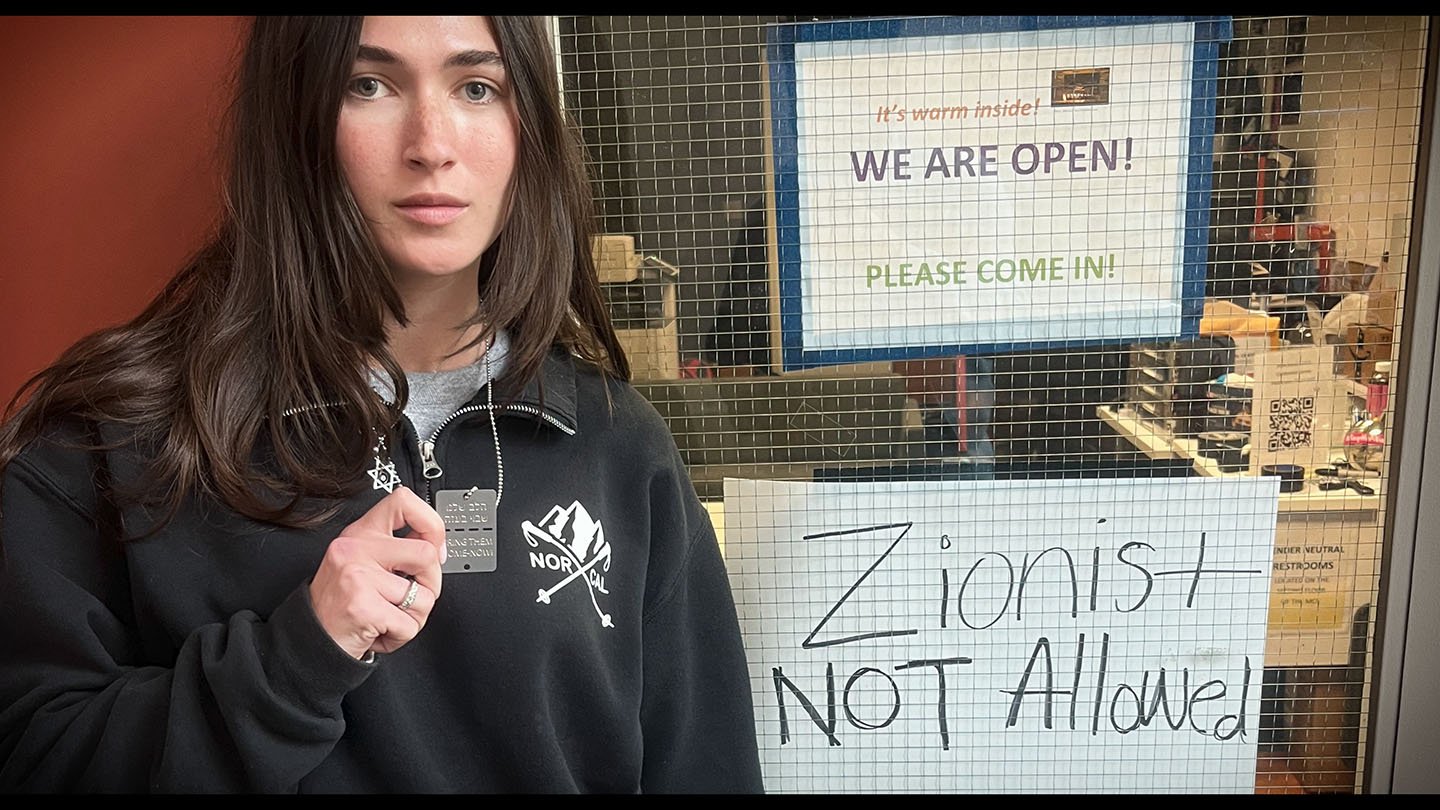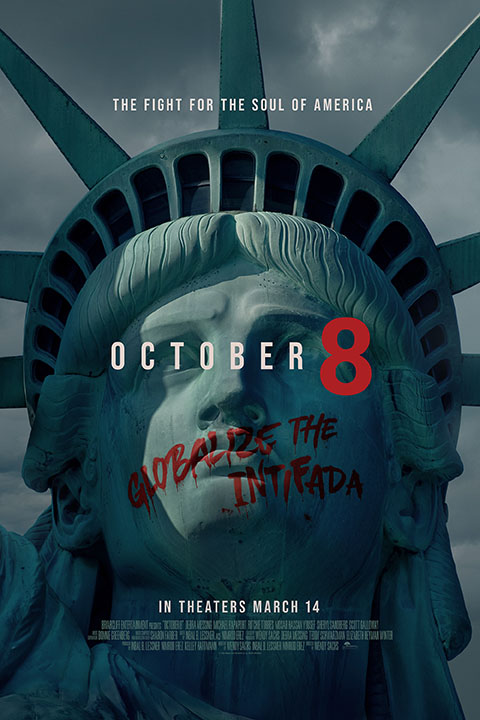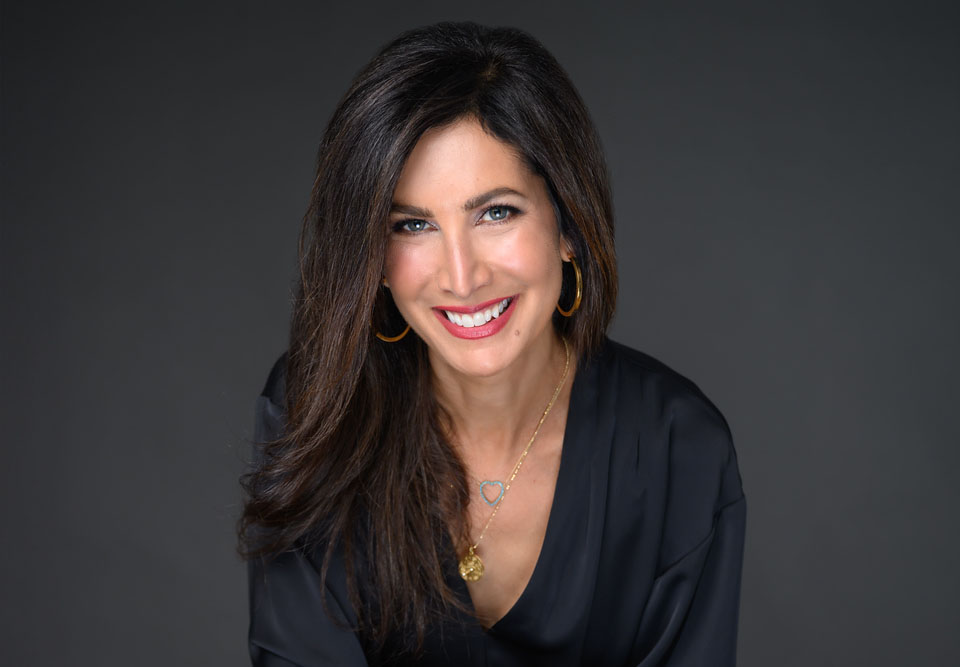
On October 8, the day after Hamas massacred innocent Israelis and kidnapped babies and elderly people to Gaza, director Wendy Sachs knew she was going to make a documentary. She began working on her film, “October 8” (originally titled “October H8th”). Two weeks later, she already had the treatment for the film.
 At the time, she didn’t know how events would unfold—she had no idea that college students would be targeted on campuses, that Jewish people would face threats on the streets and that the world at large would turn a blind eye, or even worse, portray Israel as the aggressor and not the victim.
At the time, she didn’t know how events would unfold—she had no idea that college students would be targeted on campuses, that Jewish people would face threats on the streets and that the world at large would turn a blind eye, or even worse, portray Israel as the aggressor and not the victim.
She was told that no production or distribution company would take the film and that no theater in the U.S. would screen it. However, she didn’t give up. She recruited Emmy-winning actress and activist Debra Messing as executive producer and started interviewing people. Among the 80 interviews she conducted, 40 of which made the final cut, were actor-comedian Michael Rapaport, Mosab Hassan Yousef (son of Hamas’s founder), former Meta COO Sheryl Sandberg, Congressman Ritchie Torres, Sen. Kirsten Gillibrand of New York, U.S. Ambassador Deborah Lipstadt and college students Tessa Veksler and Talia Khan, among others.
Once she completed the film, finding a distributor was no easy task. She heard “no” again and again from agencies that didn’t want anything to do with a film about Israel. But she proved them wrong. Briarcliff Entertainment took the film and is distributing it in 100 theaters across the U.S., including Regal Cinemas and AMC. The film was released March 14.
“Every agency I went to, they said, ‘We love the film and what you are doing, it’s great, but sorry, we are not going to represent you,’” Sachs said in an interview with the Journal. “And then I got to Tom Ortenberg, the head of Briarcliff, who really loved the project. He realized it’s a good story and it’s a quality and premium documentary. I would argue it’s the best documentary out there today.”
Sachs (“Surge,” “Land of The Giants: Titans of Tech”) believes “October 8” to be her best and most important project. The film explores what happened after October 7—the rise of antisemitism on college campuses, the silence of university faculties, the fear Jewish students have for their own safety and why so many students joined Students for Justice in Palestine (SJP). What she uncovered was nothing short of shocking.

It will come as no surprise that SJP is funded by terror organizations, but how they infiltrated American campuses has long been a question. Hamas had effectively acted as a PR company, strategizing how to accomplish just that. In 1993, 25 Hamas leaders met at a Marriott airport hotel in Philadelphia. The FBI wiretapped the room, recording every word they said. There, they concocted a plan to infiltrate American campuses and the media hotel in Philadelphia. They determined that the most effective approach was to use key words in their propaganda that would resonate with their audience, including “apartheid” and “oppression.”
“That was mind-blowing to me and everyone else on our team,” said Sachs about the recording she reveals in the film. “I had some sort of foundational knowledge, but I had no idea how sophisticated they are—how they are really being financed from abroad, how they are connected to the Muslim Brotherhood, to Hamas and terror organizations—and you can really trace it back to Iran.”
Viewers should be prepared to feel frustrated, shocked, annoyed and disgusted by what Jewish students have endured since October 7. True, much of it has already played out on social media and in the news, but there is nothing like seeing it all packed into a well-crafted 100-minute film.
“We had around 150 hours of footage. Cutting it down to 100 minutes was a challenge, but I had an incredible group of editors,” said Sachs. “We wanted the pace of the film to be fast—not too academic or boring—just constantly moving. That was the heavy lift.”
One assistant professor at Columbia University, Shai Davidai, is seen in one scene on the film, on campus during a pro-Israel rally. “I’ve been asked in the past few days, ‘Aren’t you afraid to speak up? You’re putting your job on the line,’” he said. “You got it all wrong. I’m not afraid to speak up—I’m speaking up because I’m afraid.”
Perhaps the most frustrating part of the documentary is the silence of individuals and groups who are supposed to stand for women’s rights, children and victims of terrorist attacks.
Journalist and author Douglas Murray recalled what happened in northern Nigeria in 2014 when the Islamic terrorist group Boko Haram abducted 276 mostly Christian female students. There was an outcry around the world. However, “when Israeli children were abducted, silence in the world,” said Murray.
Messing expressed her disappointment in Hollywood. “No one was speaking about the hostages,” she said. “I thought that there would be an army of activists and celebrities and I felt completely betrayed.”
Actor-comedian Michael Rapaport, who has been a vocal advocate since October 7, participated in a rally supporting Israel and noticed that he was one of only two celebrities present. “I know where I am on the pecking order. There are bigger names [and] the fact that I was the big Hollywood name—it’s f**king disappointing,” he told Sachs.
Rapaport pointed out that people in the entertainment industry stand up for many causes, such as Black Lives Matter, the war in Ukraine, and LGBTQ rights, but were unwilling to speak about the terror attack on innocent Israelis and the hostages in Gaza. Their silence was deafening.
Sachs plans to take the film to college campuses. She has already screened it at the University of Washington, Northwestern, Duke and UT Austin. She views the film as an educational tool for both school administrators and students.
“We are going to be creating curriculum and are working with companies that specialize in developing educational materials that will align with the film and be taught in schools,” she said. “Kids don’t know much. I don’t mean that in a disrespectful way, but people don’t understand what antisemitism is and I think that’s such a big fundamental takeaway of the film—to help young people understand.”
“October 8” had no investors; it was entirely funded by Jewish philanthropists who recognized its importance. These were people who had never given money to a film before. Sachs met them through friends of friends, on Zoom or by making phone calls. They were all eager to help.
“This is my life’s work. I put everything I’ve got into it. I couldn’t have done it without the Jewish community.”
“They felt it was urgent to document this moment and show the world what antisemitism looks like today. This is my life’s work. I put everything I’ve got into it. I couldn’t have done it without the Jewish community. I have an army of support behind me.”

































 More news and opinions than at a Shabbat dinner, right in your inbox.
More news and opinions than at a Shabbat dinner, right in your inbox.